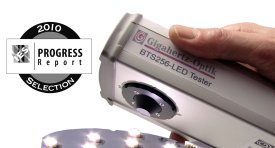Oct 20 2010
Gigahertz-Optik’s BTS256-LED Spectrolightmeter will be formally recognized in the 2010 IES Progress Report at the Illuminating Engineering Society (IES) of North America annual conference this November in Toronto, Canada. The IES Progress Committee certifies and recognizes the BTS256-LED as a unique, innovative and significant advancement to the art and science of lighting and a significant engineering advancement for the lighting industry.
The key to the award is the BTS256-LED Bi-Tec Sensor which employs a high precision photometric filtered photodiode for accurate flux detection over a wide dynamic range combined with a compact diode array spectrometer. The measured spectral data is used for on-line correction of any photopic spectral mismatch error inherent in the filtered detector spectral response.

The portable hand-held BTS256-LED is designed to measure luminous flux or illuminance, color data and spectral distribution of pc board mounted LEDs, discrete LEDs within a module, miniature lamps, endoscopes and any narrow beam emitting light source. Larger size light sources can be measured by either attaching the BTS256-LED tester to a Gigahertz-Optik integrating sphere or by measuring illuminance using a screw-on diffuser window.
Gigahertz-Optik is a world class manufacturer of innovative UV-VIS-NIR optical radiation measurement instrumentation for specification critical industrial, medical and research applications.